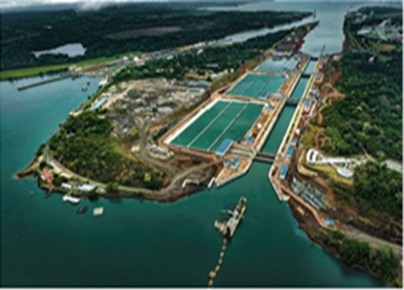Growing Concern Over Low Water Levels in Panama Canal
2023-11-10

The Union of Pilots of the Panama Canal views with extreme concern the current situation of the low water levels of the Gatun and Alajuela lakes as a result of the climatological changes that the hydrographic basin is suffering and that not only affect the operations of the waterway, but also the supply of drinking water to approximately 50% of the population of the provinces of Panama, West Panama, and Colón.
Although these are events beyond our control, the lack of interest of our authorities in making decisions and specific actions that help avoid a major crisis for the Canal, as well as for the supply of drinking water, is unacceptable since the Administration of the Panama Canal has already presented to the Executive the measures that must be taken. But to date, we only see inaction on their part, the pilots point out.
According to the pilots, allowing our country's main asset and resource to be immersed in an unprecedented situation due to apathy and lack of will is an attack on operational continuity and its profitability that could bring significant repercussions in the medium and long term for the Canal of all Panamanians.
The international maritime industry is aware of the administration's water-saving measures that will be implemented for the dry season from now until February. However, what will happen in March and April, considering that the first rains have been forecast for the beginning of May, asks the Pilots' Union.
We are aware that the country is going through challenging times, but for the reasons stated, we responsibly express that our main asset is threatened and will not be accomplices of such an offence to the nation.
The time to make decisions is now and not tomorrow. Do we want to guarantee the availability of drinking water supplied by the Alajuela and Gatun lakes for the population? Do we want to maintain the profitability of the Canal? Do we want it to continue operating continuously?
In addition, they warn the government that every day we delay establishing the route to follow, the consequences could be disastrous and irreversible for the country.
The restriction measures that the Panama Canal Authority (ACP) has been applying due to the prolonged drought led the CEO of the shipping company Ocean Network Express (ONE), Jeremy Nixon, to send a note to the President of the Republic, Laurentino Cortizo, due to the lack of significant infrastructure projects to increase the supply of fresh water, so they are analyzing other routes for Asian cargo.
The Maritime Chamber of Panama (CMP), after the announcement of the new transit restriction, urgently asked the National Government to "prioritize the evaluation of the proposals that allow finding a solution that minimizes the serious impacts that the waterway is facing."
In addition to the delay in rainfall, the ACP has been warning for some years about new sources or reservoirs of fresh water for human consumption and the operation of the interoceanic waterway, with the hydrographic studies of Lake Bayano and the Indio River as its north.
To maintain efficient operation, the ACP has been conditioning operations with temporary measures since July 30, including suspending reserve auctions and, therefore, transporting ships through its locks.
The most recent schedule began on November 3 and will be phased out through February 2024. Without temporary measures, the Canal recorded an average transit of 36 vessels per day; however, in November, bookings will range between 25 and 24 transits. In December, there will be a little more than 22 transits.
By January 2024, bookings will fall to 20; in February, they will be reduced to 18 daily transits.
Japan's Eneos Group recently paid $3.97 million at auction to secure the crossing, bidding documents show. This is in addition to the usual transit fees businesses pay, which can be hundreds of thousands of dollars more.









